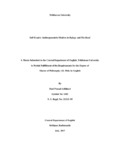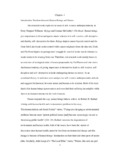Please use this identifier to cite or link to this item:
https://elibrary.tucl.edu.np/handle/123456789/3066| Title: | Self Evasive Anthropocentric Motives in Refuge and The Road |
| Authors: | Adhikari, Hari Prasad |
| Keywords: | Literature;Refuge |
| Issue Date: | 2017 |
| Publisher: | Central Department of English |
| Abstract: | This research work examines how Terry Tempest Williams’ Refuge and Cormac McCarthy’s The Road give importance to human beings and ignore nature. This tendency of ignoring nature is self- evasive, self- deceptive and thereby self- destructive for human beings. Refuge presents the narrative of nuclear testing in Utah which is geared by human desire to assume power, but this anthropocentric hubris causes cancer with which a majority of population suffers beyond cure; and the Great Salt Lake also overflows due to human encroachment on it. Likewise, in The Road, the protagonists, an unnamed man and a boy suffer from hunger and insecurity in the woods because the woods have turned into grey site ensuing from wars. This research studies both the texts in the light of ecological crisis of reason propounded by Val Plumwood who views that human tendency of giving importance to themselves leads to self- evasive and self- destructive attitude endangering their existence. The research comes up with a finding that human beings impose their supremacy on nature, but such an attitude endangers them and nature alike and that there is no human survival unless they realize their presence in the presence of other parts of nature. |
| URI: | http://elibrary.tucl.edu.np/handle/123456789/3066 |
| Appears in Collections: | English |
Files in This Item:
| File | Description | Size | Format | |
|---|---|---|---|---|
| Cover Page-4.pdf | 136.49 kB | Adobe PDF |  View/Open | |
| Chapter.pdf | 643.55 kB | Adobe PDF |  View/Open |
Items in DSpace are protected by copyright, with all rights reserved, unless otherwise indicated.
